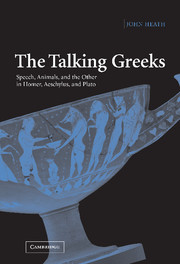Introduction
Published online by Cambridge University Press: 22 September 2009
Summary
The thesis of this book is embarrassingly unsophisticated: humans speak; other animals don't. This zoological platitude formed the basis – indeed, the motivation – for much of the ancient Greeks' profound and influential exploration of what it means to be human.
It has long been found useful in both literary and anthropological studies to quote out of context Lévi-Strauss' famous observation (he was critiquing totemism) that animals are chosen to convey certain ideas not because they are good to eat, but because they are good to think with. But for the agrarian Greeks, whose hands were dirty from the earth and animals they worked with and struggled against every day, animals were also good to think about. The Greeks were hard-working pragmatists as well as our intellectual and cultural forebears. They were farmers, and their understanding of human nature and animals was shaped by very different “formative” experiences than those of most of us who study them. To take what I hope is an extreme example, my own childhood familiarity with animals in the suburbs of Los Angeles was limited to a series of family basset-hounds (not exactly Laconian hunting dogs), my sister's pet rat, and a blood-sucking half-moon parrot named Socrates, whom my mother, like the Athenian mob 2,400 years before, finally shipped off to Hades with a tainted beverage.
- Type
- Chapter
- Information
- The Talking GreeksSpeech, Animals, and the Other in Homer, Aeschylus, and Plato, pp. 1 - 36Publisher: Cambridge University PressPrint publication year: 2005

